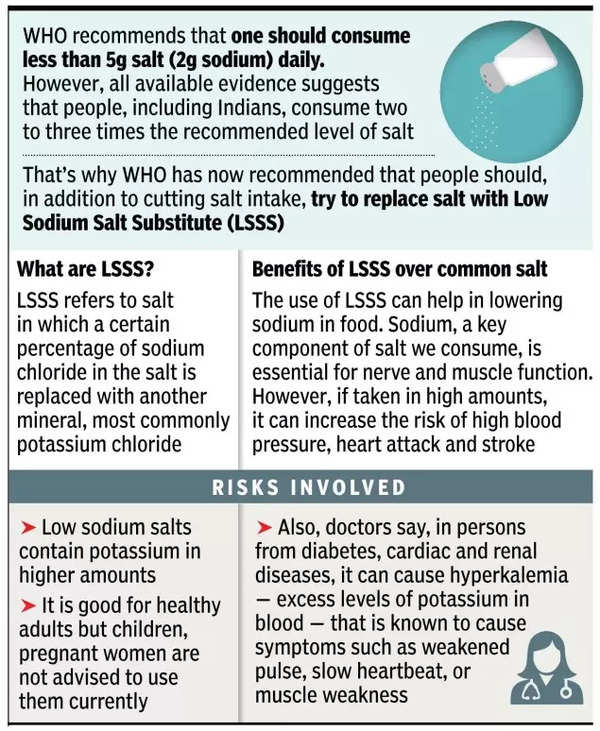NEW DELHI: In a renewed effort to reduce sodium intake, WHO has recommended that people should consider replacing regular table salt with Lower-Sodium Salt Substitutes (LSSS).
LSSS refers to the salt form in which a certain percentage of sodium chloride is replaced with another mineral, most commonly potassium chloride. Use of LSSS when compared to regular salt is linked with reduction in heart attack and stroke risk, WHO said.
WHO, in 2012, had issued a guidance document that was later adopted by member states including India which set a global target to reduce mean population sodium intake by 30% by 2030. But current trends suggest slow progress which is why it has come up with this new strategy to promote LSSS, in addition to encouraging member states to reduce overall sodium intake.
It is sold by different brands in India and has 15- to 30% less sodium. However, its uptake is very low due to higher cost and low awareness. Pink Himalayan salt, black salt and sea salt, that are growing in popularity, do not fall in this category.

WHO recommendation is based on findings from 26 randomised controlled trials in adults in which assignment to LSSS compared to regular salt resulted in reductions in blood pressure over 56 days to five years of follow-up. LSSS is not only low in sodium, but also contains potassium which is associated with lower levels of blood pressure.
However, WHO warns, high levels of potassium can be harmful to those with impaired kidney function because their kidneys may not be able to excrete mineral leading to hyperkalemia – a condition that affects heart function and can be life-threatening. WHO guideline on LSSS is, therefore, not applicable for individuals with kidney impairments or with other circumstances or conditions that might compromise potassium excretion. As there is insufficient evidence of the benefits of substituting regular table salt with LSSS in children & pregnant women, these two categories have also been kept out of the ambit of WHO recommendation.
Dr Mohit Gupta, professor of cardiology at Delhi’s G B Pant hospital said switching to low-sodium salt substitutes can be beneficial for most people in reducing sodium intake and lowering blood pressure, thereby decreasing the risk of cardiovascular diseases.
Dr Kameshwar Prasad, head of neurology at Fortis Healthcare and Dr Kunal Gandhi, senior consultant, nephrology at Amrita Hospital Faridabad, on the other hand, suggested that it may be better to encourage cutting down salt intake instead of promoting LSSS.
